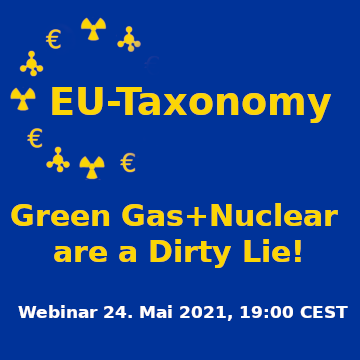EU Taxonomy: Green Gas and Nuclear are dirty lies!
In a webinar, we present the current state of the taxonomy, look at its meaning, and highlight the impact of gas and nuclear lobbies on the process. German: Monday, May 24, 7 pm CEST | English: Monday, May 31, 7 pm CEST

The European Union is drafting a regulation for the classification of sustainable finance products, the so-called Taxonomy. This sounds boring and bureaucratic, but it is actually one of the most significant projects of recent years and an important building block of the Green New Deal. Accordingly, the natural gas and nuclear lobbies, as well as various European countries, are trying hard to have their dirty technologies classified as sustainable. It‘s their ultimate attempt of greenwashing – with implications far beyond the financial sector and disastrous consequences for the climate and the environment.
In this webinar, we present the current state of the taxonomy, look at its meaning, and highlight the impact of gas and nuclear lobbies on the process. We examine the role of the EU member states and their backstage bargaining – and we will discuss the role of the climate justice movement in this context.
The taxonomy shows: it is important to address even this seemingly boring endeavor. Together, the climate justice movement must scandalize the processes around the taxonomy and increase public pressure to prevent the inclusion of fossil gas and nuclear.
The webinar will be held one time in German and one time in English:
German: Monday, May 24, 7 pm CEST
English: Monday, May 31, 7 pm CEST
Dial in via BigBlueButton
https://conference.sixtopia.net/b/koo-w6d-ahq
We are looking forward to meet you and to kick the gas and nuclear lobby in the ass!




